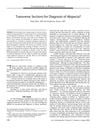Is Seborrhoeic Dermatitis Associated with Diffuse, Low-Grade Folliculitis and Progressive Cicatricial Alopecia?
March 2015
in “
Australasian Journal of Dermatology
”
seborrhoeic dermatitis cicatricial alopecia seborrhoeic folliculitis scalp inflammation scarring hair loss spongiotic dermatitis parakeratotic lipping scarring alopecia follicular density perifolliculitis fibrosis tar-based shampoos doxycycline erythromycin estolate scalp itch hair fall hair thinning tar shampoos

TLDR Seborrhoeic dermatitis may cause a condition called "seborrhoeic folliculitis," leading to chronic scalp inflammation and scarring hair loss.
The study investigated the potential link between seborrhoeic dermatitis and cicatricial hair loss in adults, suggesting "seborrhoeic folliculitis" as a new term for a condition that causes chronic scalp inflammation and progressive scarring hair loss. Out of 56 patients experiencing symptoms such as scalp itch, hair fall, and thinning, 32 underwent scalp biopsies. These patients, comprising 35 females and 21 males with an age range from late teens to over 70, showed signs of mild spongiotic dermatitis, focal parakeratotic lipping of hair follicles, mild scarring alopecia with reduced follicular density, and mild chronic perifolliculitis with fibrosis upon histopathological examination. Treatment with tar-based shampoos and doxycycline, or erythromycin estolate as an alternative, provided rapid symptom relief and stopped the progression of hair loss. The study concluded that seborrhoeic folliculitis is a distinct condition that leads to diffuse, progressive cicatricial alopecia associated with low-grade seborrhoeic dermatitis and folliculitis.









